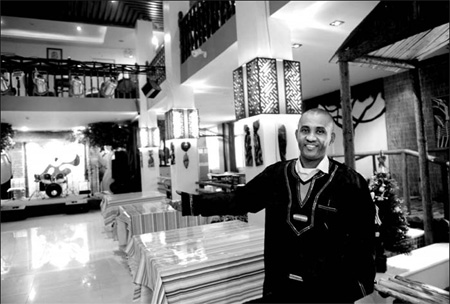It's all about trust
|
Turay Lamin in his newly opened Turay's Africa Home, a restaurant and entertainment center in Beijing. Zhao Jing |
Turay Lamin, 44, from Sierra Leone, compares the China-Africa relationship to a marriage.
"The two should stay married and not divorce," he says. "Love, when it first happens, feels very sweet. But once people get married, they need to share responsibility."
China-Africa relations date back hundreds of years, to the time when Chinese mariner Zheng He led a fleet to East Africa, says Lamin, who opened Beijing's first African restaurant, Tim Boucktou, at Maizidian in 1998.
"The ivory mat Chinese emperors used came from Africa. Even today, there are Chinese descendants in that region," he says.
Lamin has many African friends who are married to Chinese women. But few such couples enjoy the backing of their families. "The Chinese family often sees Africa as too far away, while the African family doubts a Chinese wife can work like an African woman," he says.
"People like to think the Chinese don't like the blacks, or that black people don't like the Chinese. But it's not that. It is the fear of the unknown, which most people are afraid to admit."
After 15 years in Beijing, the African opened Turay's Africa Home, a restaurant and entertainment center, not far from Landau Shopping Mall, on Dec 6.
"What I want to do is to create an African experience for Chinese-African spouses, like wedding ceremonies, at Turay's Africa Home and help them understand each other," he says. "I intend to build it into a center of Sino-African friendship, culture and entertainment."
Lamin, an economics major, came to Beijing in 1994.
After studying Chinese for half a year, he made his first foray in business, selling second-hand motorcycles from Guangzhou to Nigeria, for use as a kind of taxi service. He followed up the opening of Tim Boucktou, with another restaurant, Turay's Place, at Xingfu Ercun.
Over the years, Lamin has accumulated experience and knowledge in not just business, but also about dealing with people.
"If you want to understand people, and create a relationship, you need to speak their language," he says. "You need to first make friends with the Chinese, before doing business with them. If you don't establish a proper feeling between people, the business just does not last."
He says he likes Beijing because it has been easy for him to expand his circle of friends.
Lamin set up a business office in Beijing as early as in 1999, because he realized he had to keep everything legal. He understood the importance of good working methods and proper management.
He has been using the same mobile number for 12 years and has the right paperwork for everything.
He works with long-term Chinese business partners and gives his Chinese chefs and waitresses double salary for important festivals.
"Some people think it is impossible for an African to achieve anything in business in China," he says. "But actually, once they understand what they can do legally, they will find that almost all business rules here give an advantage to foreign business people."
Speaking fluent Chinese, English, French and Arabic, Lamin says at times, 80 percent of the calls he makes on his mobile are to explain to friends what they don't understand about living and working here.
"It's not about good or bad," he says. "It's what people are used to and what they can accept."
As for the food he serves at his restaurant, Lamin has tried hard to convince his African friends that Chinese chefs can cook African food. To do this, he even duped his African friends at first telling them an African cook was preparing their food. Two months later, when he found the food was being received well, he came out with the truth that it was a Chinese chef trained by his wife who was doing the cooking.
As for the Chinese, he tries to help them recognize familiar elements in African cuisine. He uses cassava from Guangxi, makes a sauce with water melon seeds, names West African patties feizhou jiaozi and Moi-moi palm oil bean pudding, feizhou doufu.
He says he has already seen some Chinese customers.
"They hesitate at first. But once they have tried it, they always leave favorable comments," he says. "I know my work will be very difficult, but I'm confident I can prepare a cuisine acceptable to both the Chinese and the Africans."
Lamin says his new "Africa Home" is his dream project. The next step is to establish a young African professionals' association.
"I really want to promote Sino-African business cooperation," he says.
"I hope it will always be a 'happy marriage' between the two peoples."
(China Daily 12/28/2009 page8)















